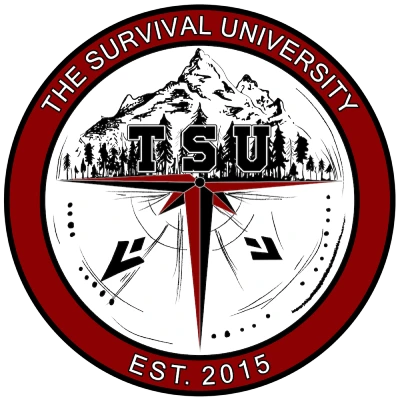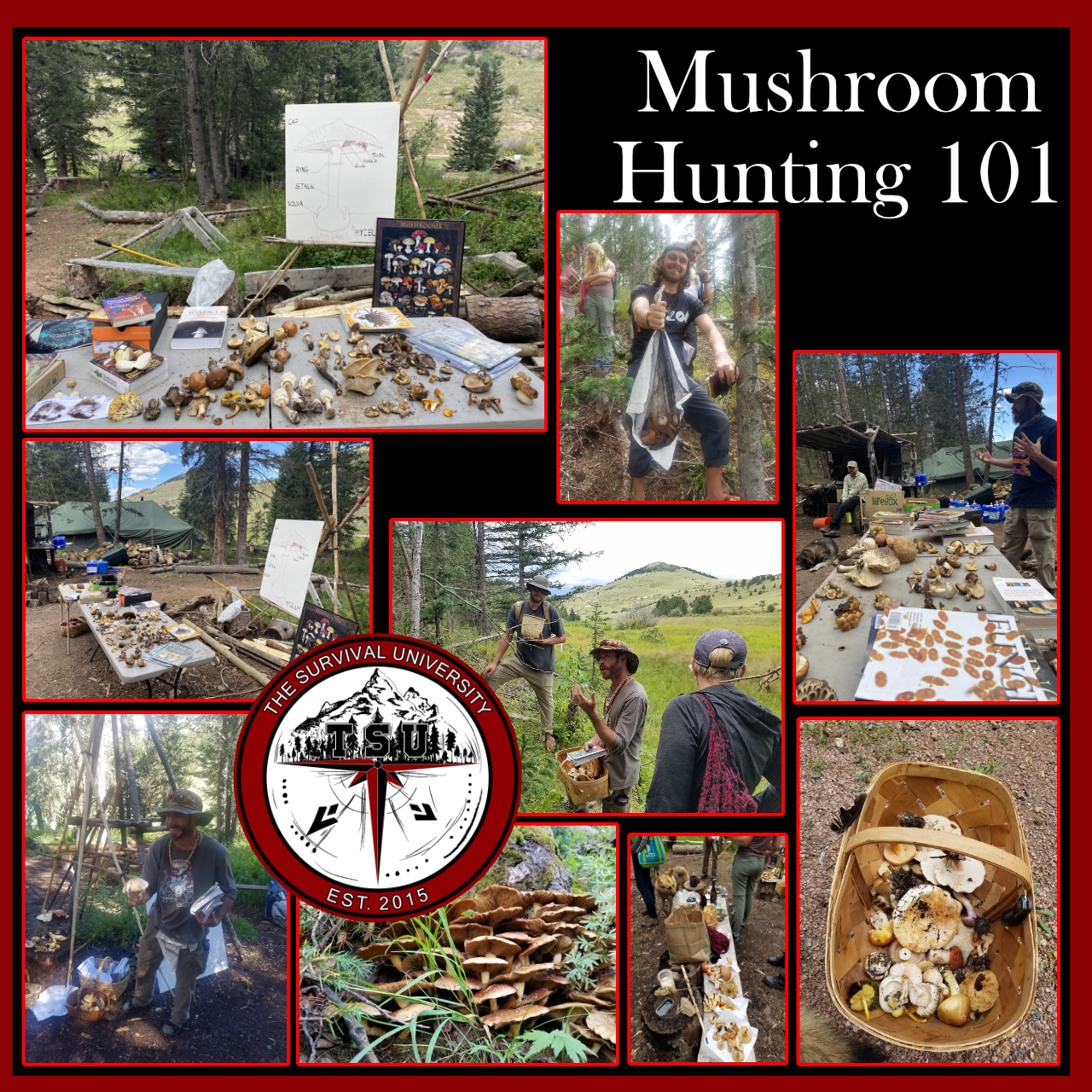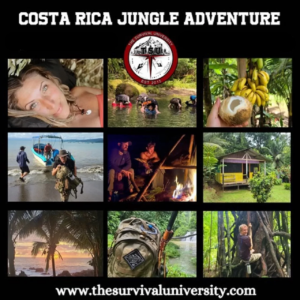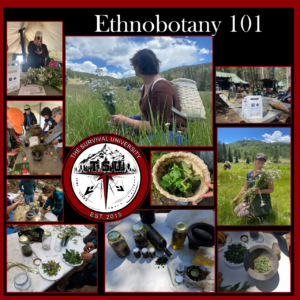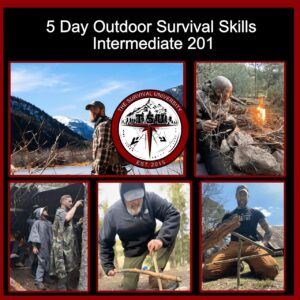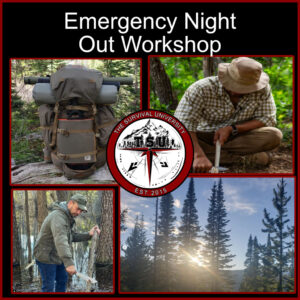Cart
MUSHROOM HUNTING 101
1 Day Class – You will stay at our camp location and learn about and harvest the mushrooms at that location. At the end of the day you can cook up your mushrooms with us if you like or return home to enjoy them in your own kitchen.
Description
Mushroom Hunting & Foraging 101 – 1-Day Course
Learn Wild Mushroom Identification, Foraging Techniques, and Edible Uses
Step into the woods for a full day of hands-on mushroom hunting and wild foraging. This immersive class is perfect for beginners and enthusiasts who want to learn how to identify, harvest, and cook wild mushrooms found in Colorado’s beautiful backcountry.
In this 1-day mushroom foraging course, you’ll stay at our camp location and explore nearby terrain to learn the art of mushroom identification and safe harvesting. You’ll gain field-based experience with mushroom anatomy, toxic vs. edible lookalikes, and tree and plant associations that help you locate high-yield zones. We’ll teach you how to spot medicinal mushrooms, edible mushrooms, and even a few to avoid.
What You’ll Learn in This Mushroom Foraging Class
-
How to identify edible, poisonous, and medicinal mushrooms
-
Mushroom anatomy and terminology for accurate identification
-
Tree and plant relationships that help you find mushrooms in the wild
-
How to use field guides, apps, and photos for documentation
-
Foraging ethics and sustainable collection practices
-
Basic cooking and preparation tips for wild mushrooms
After a day in the field, you’re invited to cook and taste your harvest with us back at camp—or take them home to your own kitchen for a wild food experience you’ll never forget.
Foragers Take Note
This is an information-packed day, so come prepared to learn, take notes, and explore. While we plan this course around optimal mushroom growing seasons at our camp’s elevation, we cannot guarantee a certain quantity or variety of mushrooms, as nature doesn’t follow a fixed schedule. No refunds will be given unless the course is canceled by TSU staff.
Why Take a Mushroom Hunting Class?
Whether you’re new to foraging or want to gain more confidence in identifying edible mushrooms in the wild, this class gives you practical skills and the ability to safely gather and enjoy one of nature’s most fascinating foods. You’ll walk away with more than mushrooms—you’ll gain knowledge that can support backcountry cooking, natural medicine, and self-reliant living.
NOTE:
While every effort is made to forecast the optimal mushroom harvesting season at the camp’s elevation based on past growth patterns, we are unable to ensure a guaranteed abundance of mushrooms. Our endeavors are confined to the resources nature presents, and this understanding shall preclude any entitlement to a refund. By enrolling in the class, students acknowledge and agree that no refunds will be given unless this class is cancelled by TSU staff or instructors.
LENGTH:
3 days/2 nights
ACCOMMODATIONS
We do have a central community campfire location with a few designated campsites but mostly offer dispersed camping. Students will be able to drive their car within 100 feet of the main camp and will not have to hike gear for long distances.
- Sanitation/Hygiene: A portable restroom and potable water will be provided at the main camp.
FOOD AND WATER REQUIRED
Water will be provided but students will need to bring their own food. We recommend quick field expedient meals such as freeze dried hiking meals or MRE’s. They can quickly be made at our primitive camps and won’t slow down the learning process. However, students may bring any food that they wish to cook over the campfire or on their own personal camp stove.
Food can be purchased locally at nearby facilities. Walmart and several local eateries are within a reasonable driving distance.
SUGGESTED GEAR LIST
We do not provide students with gear unless they have purchased it from us ahead of time. Not much gear is needed for our courses, though good equipment does speed the learning process up greatly! Gear does not have to be purchased from our store to attend the course, but we recommend survival gear of equivalent quality.
-
Day Hike Essentials for a 1-Day Foraging Class
-
Small backpack or daypack
(To carry all your gear, food, water, and finds) -
Water bottle or hydration system
(At least 1–2 liters, depending on the season) -
Snacks and/or packed lunch
(Field-friendly food to keep your energy up) -
Weather-appropriate clothing
-
Lightweight layers (synthetic or wool — no cotton)
-
Rain jacket or windbreaker
-
Hat (sun or warmth depending on season)
-
Comfortable hiking shoes or boots
-
-
Sunscreen and sunglasses
(Even on cooler days, UV can be intense) -
Bug spray or insect repellent
(Ticks and mosquitoes can be active, especially in shady woods) -
Basic first aid supplies
(Blister care, band-aids, personal medications)
-
CLOTHING REQUIRED
Warm outdoor clothing, warm gloves and hat, outdoor boots and wool socks. Cotton clothing is highly discouraged in the mountains! Wool will keep you warm even when wet and synthetics will dry faster. Layers are important in Colorado. You will want a water wicking base layer, an insulating mid layer, and a waterproof breathable outer shell. Check out our Clothes Layering Basics if you are unsure of what to wear.
NOTE
Due to the different levels of prior experience and knowledge among students in each class, individual outcomes may vary. Weather conditions can also be a factor in changing class content slightly. Nonetheless, our instructors will always endeavor to be as accommodating and consistent as circumstances will allow to ensure students get the best training experience and value for money.
Recommended Tools for Mushroom Foraging Class
Must-Haves:
-
Mushroom foraging knife
(Preferably with a curved blade and brush for cleaning dirt off specimens) -
Mesh foraging bag or basket
(Allows spores to spread while you hike — mesh bags or woven baskets are best) -
Field guide to local mushrooms
(Bring your own or use one of ours — physical or digital is fine) -
Notebook and pen/pencil
(To record conditions, location, and observations) -
Phone or camera
(For photo documentation and ID backup) -
Small ruler or measuring tape
(For cap and stem size, gill spacing, etc.)
Nice-to-Haves:
-
Hand lens or loupe (10x magnification)
(To see fine details like gill structure, spores, and surface texture) -
GPS or mapping app
(To mark locations of finds or interesting habitats) -
Cooking gear (if staying to cook):
-
Small camp stove or portable grill
-
Lightweight pan or pot
-
Olive oil or butter
-
Salt/spices (optional)
-
Eating utensils
-
